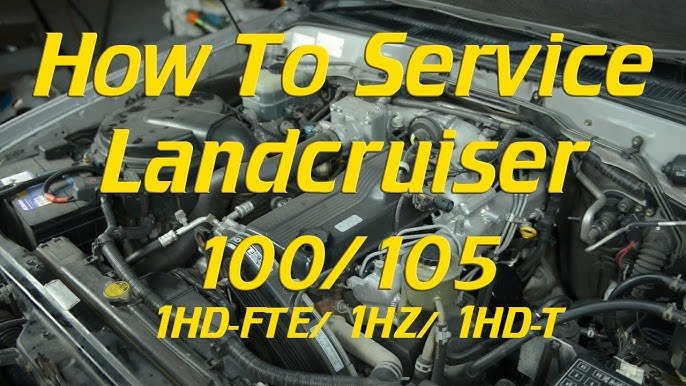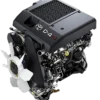1HD-FTV Engine Maintenance Schedule: Tips for Optimal Performance
1HD-FTV Engine Maintenance Schedule: Tips for Optimal Performance
The Toyota 1HD-FTV engine has carved out a reputation for durability and performance, especially in rugged conditions. Found primarily in the iconic Toyota Land Cruiser and other heavy-duty vehicles, this 4.2-liter inline-six turbocharged diesel engine is a favorite among off-road enthusiasts and those who demand reliability. To ensure your 1HD-FTV engine performs optimally and remains in good condition, adhering to a comprehensive maintenance schedule is essential. In this blog post, we’ll explore a detailed maintenance schedule, key tips, and best practices for keeping your 1HD-FTV engine running smoothly. 1HD-FTV Engine Maintenance Schedule: Tips for Optimal Performance
Understanding the 1HD-FTV Engine
Before diving into maintenance specifics, it’s important to understand what makes the 1HD-FTV engine unique. This engine features a robust design with direct fuel injection and a turbocharger, which enhances its power output and torque. The 1HD-FTV typically produces around 202 horsepower and 430 Nm of torque, making it well-suited for heavy loads and off-road adventures. 1HD-FTV Engine Maintenance Schedule: Tips for Optimal Performance
Importance of Regular Maintenance
Regular maintenance is crucial for any engine, but particularly for the 1HD-FTV, given its demanding applications. Proper maintenance can help:
- Extend Engine Life: Routine checks can catch issues early, preventing major repairs down the line.
- Enhance Performance: A well-maintained engine operates more efficiently, providing better power and fuel economy.
- Ensure Reliability: Consistent upkeep reduces the risk of breakdowns, especially in challenging environments. 1HD-FTV Engine Maintenance Schedule: Tips for Optimal Performance
Maintenance Schedule Overview
Here’s a general maintenance schedule for the 1HD-FTV engine. This can be adapted based on usage, driving conditions, and manufacturer recommendations.
Daily Checks
- Fluid Levels: Check engine oil, coolant, and brake fluid levels before starting your vehicle. Ensure they are within the recommended range.
- Visual Inspection: Look for any signs of leaks under the vehicle and check for unusual noises or vibrations while driving.
- Tire Condition: Ensure tires are properly inflated and show no signs of damage. 1HD-FTV Engine Maintenance Schedule: Tips for Optimal Performance
Every 5,000 Kilometers (3,100 Miles) or 6 Months
- Oil Change: Replace engine oil and oil filter. Use high-quality oil that meets Toyota specifications to ensure proper lubrication.
- Air Filter: Inspect and clean or replace the air filter as necessary, especially if driving in dusty conditions.
- Fuel Filter: Check the fuel filter for clogs. Replace it if necessary to prevent fuel system issues.
Every 10,000 Kilometers (6,200 Miles) or 12 Months
- Coolant System Check: Inspect the cooling system for leaks and ensure that the coolant is at the correct level and condition. Flush and replace coolant as needed.
- Brake System Inspection: Check brake pads, discs, and fluid levels. Replace worn components to maintain braking efficiency.
- Transmission Fluid: Inspect transmission fluid levels and condition. Change fluid if it appears dirty or if it has been more than 40,000 kilometers (25,000 miles) since the last change. 1HD-FTV Engine Maintenance Schedule: Tips for Optimal Performance
Every 20,000 Kilometers (12,400 Miles) or 24 Months
- Timing Belt Inspection: Inspect the timing belt for wear, cracks, or fraying. Replace it if any issues are found. It is typically recommended to change the timing belt every 100,000 kilometers (62,000 miles).
- Injectors Check: Have the fuel injectors inspected and cleaned if necessary. This helps maintain fuel efficiency and performance.
- Battery Check: Inspect the battery for corrosion on terminals and check its charge. Clean terminals and replace the battery if it shows signs of weakness. 1HD-FTV Engine Maintenance Schedule: Tips for Optimal Performance
Every 40,000 Kilometers (24,800 Miles) or 48 Months
- Full Engine Inspection: Conduct a comprehensive engine inspection, including checking belts, hoses, and the exhaust system for wear and leaks.
- Turbocharger Maintenance: Inspect the turbocharger for any signs of wear, such as excessive play in the turbine shaft. Ensure it is functioning properly.
- Differential and Transfer Case Fluids: Check and replace fluids in the differential and transfer case if applicable, as these components are crucial for off-road performance.
Every 100,000 Kilometers (62,000 Miles)
- Timing Belt Replacement: Replace the timing belt as a preventive measure to avoid catastrophic engine failure.
- Full Cooling System Flush: Perform a complete flush of the cooling system to prevent corrosion and ensure optimal heat transfer.
Tips for Optimal Performance
1. Use Quality Parts and Fluids
Always use high-quality replacement parts and fluids that meet or exceed Toyota specifications. This includes oil, filters, belts, and hoses. Quality components help maintain performance and prevent premature wear. 1HD-FTV Engine Maintenance Schedule: Tips for Optimal Performance
2. Pay Attention to Driving Conditions
Driving conditions greatly affect maintenance needs. If you frequently drive in extreme conditions—such as towing heavy loads, off-roading, or driving in hot or cold climates—consider more frequent inspections and maintenance. 1HD-FTV Engine Maintenance Schedule: Tips for Optimal Performance
3. Keep the Engine Clean
Regularly clean the engine bay to remove dirt, debris, and oil build-up. A clean engine allows for better heat dissipation and makes it easier to spot potential leaks or issues.
4. Monitor Engine Performance
Pay attention to changes in engine performance, such as unusual noises, vibrations, or a drop in power. If you notice anything abnormal, investigate the cause promptly to prevent further damage.
5. Document Maintenance Activities
Keep a detailed log of all maintenance activities, including dates, mileage, and services performed. This helps you track maintenance schedules and can be beneficial for resale value. 1HD-FTV Engine Maintenance Schedule: Tips for Optimal Performance
6. Follow Manufacturer Guidelines
Always refer to the owner’s manual for specific maintenance recommendations from Toyota. Manufacturer guidelines provide valuable information tailored to your vehicle.
7. Consult Professionals When Necessary
While many maintenance tasks can be performed by DIY enthusiasts, don’t hesitate to consult a qualified mechanic for complex issues or when in doubt. Their expertise can help ensure your engine remains in peak condition. 1HD-FTV Engine Maintenance Schedule: Tips for Optimal Performance
Conclusion
The Toyota 1HD-FTV engine is a reliable and powerful choice for those who demand performance and durability. Following a comprehensive maintenance schedule is key to ensuring its longevity and optimal performance. By adhering to regular inspections, using quality parts, and being proactive about potential issues, you can enjoy the full benefits of this exceptional engine for many years. 1HD-FTV Engine Maintenance Schedule: Tips for Optimal Performance
Whether you’re navigating challenging terrains or embarking on long journeys, proper maintenance will give you peace of mind and enhance your driving experience. Remember, a well-maintained engine not only performs better but also contributes to overall vehicle safety and reliability. With diligent care, your 1HD-FTV engine will continue to deliver the performance and dependability that Toyota is known for.
Installation Guide for the Yanmar 8LV370 Inboard Diesel Engine
Customer Reviews and Experiences with the Yanmar 8LV370 Inboard Diesel Engine
Best Applications for the Yanmar 8LV370 Inboard Diesel Engine
Ultimate Guide to Upgrading the Chevy LS3 6.2L V8 to 700+ HP
Unveiling the Power and Precision of Subaru Engines: A Comprehensive Guide








